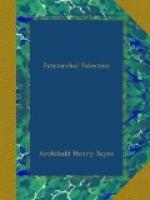Abraham had to quit Egypt, and once more he traversed the desert of the “South” and pitched his tent near Beth-el. Here his nephew Lot left him, and, dissatisfied with the life of a wandering Bedawi, took up his abode in the city of Sodom at the northern end of the Dead Sea. While Abraham kept himself separate from the natives of Canaan, Lot thus became one of them, and narrowly escaped the doom which afterwards fell upon the cities of the plain. In forsaking the tent, he forsook not only the free life of the immigrant from Chaldaea, but the God of Abraham as well. The inhabitant of a Canaanitish city passed under the influence of its faith and worship, its morals and manners, as well as its laws and government. He ceased to be an alien and stranger, of a different race and fatherland, and with a religion and customs of his own. He could intermarry with the natives of his adopted country and participate in their sacred rites. Little by little his family became merged in the population that surrounded him; its gods became their gods, its morality—or, it may be, its immorality—became theirs also. Lot, indeed, had eventually to fly from Sodom, leaving behind him all his wealth; but the mischief had already been done, and his children had become Canaanites in thought and deed. The nations which sprang from him, though separate in race from the older people of Canaan, were yet like them in other respects. They formed no “peculiar people,” to whom the Lord might reveal Himself through the law and the prophets.
It was not until Lot had separated himself from Abraham that the land of Canaan was promised to the descendants of the patriarch. “Lift up now thine eyes,” God said to him, “and look from the place where thou art, northward and southward, and eastward and westward: for all the land which thou seest, to thee will I give it, and to thy seed for ever.” Once more, therefore, Abraham departed southward from Shechem; not this time to go into the land of Egypt, but to dwell beside the terebinth-oak of Mamre hard by Hebron, where the founder of the Davidic monarchy was hereafter to be crowned king. It is probable that the sanctuary which in days to come was to make Hebron famous had not as yet been established there; at all events the name of Hebron, “the confederacy,” was not as yet known, and the city was called Kirjath-Arba. Whether it was also called Mamre is doubtful; Mamre would rather seem to have been the name of the plateau which stretched beyond the valley of Hebron and was occupied by the Amorite confederates of the Hebrew patriarch.
It was while he “dwelt under the terebinth of Mamre the Amorite” that the campaign of Chedor-laomer and his Babylonian allies took place, and that Lot was carried away among the Canaanitish captives. But the triumph of the conquerors was short-lived. “Abram the Hebrew” pursued them with his armed followers, three hundred and eighteen in number, as well as with his Amorite allies, and suddenly falling




